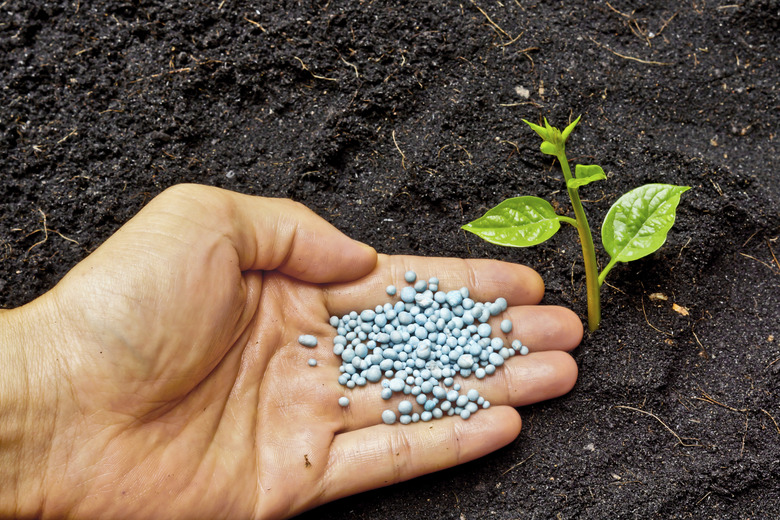Can Plant Food Go Bad?
Plant food, also called fertilizer, provides nourishment to plants. This nourishment is in addition to what is naturally in plants' soil. Plant food can range from synthetic chemicals and organic fertilizers, which are added periodically, to compost, which improves soil's nutritional content and overall structure. Synthetic plant food does not go bad when stored properly, although organic fertilizer, such as fish meal, degrades over time.
Plant Food Storage
Organic and synthetic plant foods come in a range of forms, such as granules, crystals and liquid. If your plant food has been in storage for a long time, it may need to be remixed before it is used, regardless of whether it is synthetic or organic. For example, liquid plant food may need to be shaken to suspend its solids that settled. Similarly, granules and crystals cake after their packages are opened if they are not stored in airtight containers or in a low-humidity environment.
- Plant food, also called fertilizer, provides nourishment to plants.
- Plant food can range from synthetic chemicals and organic fertilizers, which are added periodically, to compost, which improves soil's nutritional content and overall structure.
Synthetic Plant Food
Although synthetic plant food will not degrade over time, it can clump when exposed to high humidity. Synthetic plant food is at a greater risk of clumping from humidity than organic plant food because the synthetic food is formulated to dissolve quickly in water. When plant food has clumped and solidified, it can be difficult, if not impossible, to measure correctly, putting you at risk of using too much or too little of it. That factor is problematic because synthetic plant food is much stronger and more concentrated than organic plant food.
Organic Plant Food
Organic plant food, such as fish emulsion, bone meal and blood meal, becomes less effective as it degrades when stored too long. Check your organic plant food's "best if used before" date to determine whether or not it is still effective. Exposure to moisture speeds the degradation process. Because organic plant food is a natural product, it is attractive to pests, which can eat or destroy it while it is in storage. Pests attracted to organic plant food include mice, rats, cats and beetles.
- Although synthetic plant food will not degrade over time, it can clump when exposed to high humidity.
- Synthetic plant food is at a greater risk of clumping from humidity than organic plant food because the synthetic food is formulated to dissolve quickly in water.
Compost
In some cases, rotting is actually beneficial for plant food. Compost, made of rotted organic matter, is rich in nutrients and provides needed energy for soil and plants. It is also helpful in amending soil structure, encouraging moisture retention without increasing the risk of waterlogged soil. Compost is available at home garden centers, but you can make your own by letting a mixture of kitchen and yard scraps rot.
